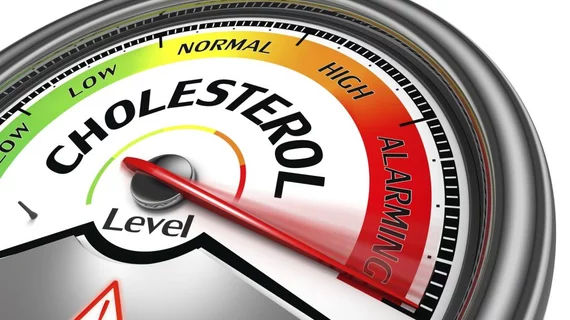Young and otherwise healthy individuals can still develop a lifetime risk of premature death from cardiovascular disease if their cholesterol levels are not within the normal range, according to new research published in Circulation.
"Our study demonstrates that having a low 10-year estimated cardiovascular disease risk does not eliminate the risk posed by elevated LDL over the course of a lifetime," lead author Shuaib M. Abdullah, MD, of the Veteran’s Affairs North Texas Medical Center in Dallas, said in a prepared statement issued by the American Heart Association. "Those with low risk should pursue lifestyle interventions, such as diet and exercise, to achieve LDLs levels as low as possible, preferably under 100 mg/dL. Limiting saturated fat intake, maintaining a healthy weight, discontinuing tobacco use, and increasing aerobic exercise should apply to everyone."
Abdullah and colleagues assessed the associations between low-density lipoprotein-cholesterol (LDL) and non-high-density lipoprotein-cholesterol (HDL) levels and cardiovascular disease (CVD) and coronary heart disease (CHD) mortality. Specifically, they sought to evaluate if people who are at low risk of developing heart health problems within the next 10 years should actively pursue lifestyle changes or take hypertensive medications.
The study cohort included more than 36,000 individuals from the Cooper Center Longitudinal Study without a history of CVD or diabetes, who also had a low-risk, or a 7.5 percent chance, of developing atherosclerotic CVD events at baseline. They were followed for 27 years.
The researchers found that LDL levels were independently associated with increased chances of mortality from CVD and there were 1,086 CVD deaths and 598 CHD deaths. In comparison to individuals who had LDL levels of less than 100 mg/dL:
- Individuals exhibiting LDL levels of 100-159 mg/dL had a 30-40 percent higher risk of CVD death.
- Individuals exhibiting LDL levels of 160-189 mg/dL had a 70 to 90 percent higher risk of CVD death.
- Individuals exhibiting LDL levels of 190 mg/dL or higher had at least a 70 percent higher risk of CVD death.
Those with LDL levels of 100-129 mg/dL died of CVD about 1.8 years sooner and individuals with an LDL of 160 mg/dL or higher died four years sooner.
Additionally, the researchers noted that HDL levels of 160 mg/dL or more should also be considered as a risk factor for increased long-term risk of CVD and CHD mortality. Further research is needed to determine if lifestyle interventions and medications will positively impact CVD outcomes in low-risk individuals with increased LDL and non-HDL levels.

